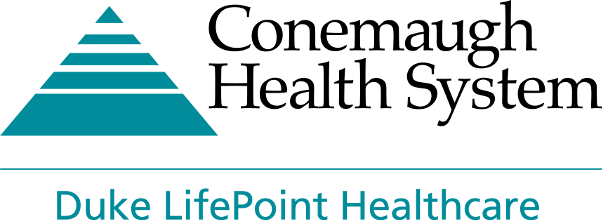Stroke Care
24/7 Stroke Care Across the System
Conemaugh Health System provides stroke care at its four hospitals, 24 hours a day, seven days a week. Conemaugh Meyersdale and Conemaugh Nason Medical Centers are Joint Commission accredited as Acute Stroke Ready Hospitals and Conemaugh Memorial is a Joint Commission accredited Primary Stroke Center and has received the American Heart Association Gold Plus award as well as the Target Stroke Honor Roll Elite and Target Type 2 Diabetes recognition.
Conemaugh Miners, Conemaugh Meyersdale, and Conemaugh Nason have the technology to have stroke patients evaluated via telestroke (telemedicine) capabilities by a neurologist at Conemaugh Memorial Medical Center. IV Alteplase or Tenecteplase (clot-busting medication) can be given at all of the Conemaugh facilities to eligible patients for acute ischemic stroke. IV thrombolytic recipients will then be transferred to one of Conemaugh Memorial Medical Center's designated stroke units where experienced staff and neurologists use the latest methods and technology to diagnose, treat, and care for stroke patients. Patients not receiving one of these clot-busting medications can be kept at their local Conemaugh facility and receive continued stroke care.
Next Steps
Outpatient Care
Conemaugh East Hills
1450 Scalp Avenue, Suite 2100
Johnstown, PA 15904
Phone: (814) 269-5211
Inpatient Care
Conemaugh Memorial Medical Center
1086 Franklin Street
Johnstown, PA 15905
Phone: (814) 534-9000
Units: 10th Floor - Ashman / Rose Pavilion, ICU, CCU
Department of Emergency Medicine
Primary Stroke Center
Conemaugh Meyersdale, Miners, and Nason Medical Centers offer telestroke capabilities. Click here to learn more.
Conemaugh Memorial Medical Center's Stroke Program offers:
- 24-hour staff readiness
- State-of-the-art diagnostic and treatment equipment to help track and monitor patient progress
- Telemedicine capabilities
- IV Alteplase or Tenecteplase (clot-busting medications)
- Sophisticated computer technology that provides patient lab results, diagnostic information, discharge information, and other confidential data quickly and securely
- Rapid CT scanning and medication administration for stroke patients.
- Direct access to neurologists for emergent and continued stroke care
Risk Factors
Stroke can affect anyone regardless of age, gender, or ethnic background.
- Age – risk of stroke doubles for each decade of life after 55
- Family history – risk increases if a parent, sibling, or grandparent had a stroke
- Race – African-Americans are at higher risk of stroke than Caucasians
- Gender – Stroke affects more men than women, but more women than men die from stroke
- Prior stroke, TIA, or heart attack – risk of stroke grows substantially if the patient has suffered any of these conditions
Additional Risk Factors
- High blood pressure
- Smoking
- Diabetes
- Carotid or other artery disease
- Atrial fibrillation, patent foramen ovale (PFO)
- Heart disease
- Sickle cell disease
- High blood cholesterol
- Poor diet
- Physical inactivity or excess weight
- Obstructive sleep apnea
Transient Ischemic Attack (TIA)
- TIAs are brief episodes of stroke symptoms that resolve within minutes or hours, unlike stroke symptoms which can last longer
- TIAs are a serious warning of an impending stroke
- TIA symptoms are the same as for stroke
- Up to 40% of patients who experience a TIA will have a full stroke; 5% will have a stroke within two days of the TIA; 10-15% will have a stroke within 90 days of a TIA
- Management of TIAs focuses on preventing a future stroke
Diagnosing Stroke
Quick and coordinated response can limit the physical and neurological damage often associated with stroke, especially if patients who suspect they are having a stroke go to the Department of Emergency Medicine within three hours of first symptoms.
The Stroke Team at Conemaugh Memorial Medical Center will perform a CT scan to further evaluate for stroke. Once stroke is confirmed, neurologists will begin immediate treatment and continue to manage the patient’s care during the hospital stay and recovery process.
Using criteria established by the National Institutes of Health, Conemaugh's Department of Emergency Medicine specialists and Neurologists evaluate the severity of the stroke and determine if the patient is eligible for clot-busting medication for the treatment of stroke.
Treatment
- Evaluation and care by vascular and neurology specialists
- CT, MRI, and other diagnostic scans
- Care by specially trained nursing teams on designated Neuro-Specialty Units
- Frequent monitoring of swallowing and speech capabilities by nursing and Speech Therapy
- Physical, Occupational, and Speech therapy by therapists educated to address the stroke patient's needs
- Ongoing assessments of pneumonia risks and blood clot-related complications
- Lifestyle changes including diet, smoking habits, and exercise
- Regular visits with a primary care physician and follow-up visits with a Neurologist to manage risk factors such as diabetes, heart disease, high blood pressure, or excess weight
- Surgery may be required to treat or remove stroke-related hemorrhages or to treat the underlying cause of a stroke, such as an aneurysm or intracerebral hemorrhage
Stroke Care Specialty Clinic Team
Working closely with the patient's family physician, Conemaugh's team includes:
- Emergency room physicians
- Neurologists
- Neuroradiologists
- Neurosurgeons
- Cardiologists
- Specially trained nurses
- Stroke coordinator to provide oversight to the program
- Neuroscience Resource Nurses
Conemaugh's team will diagnose the exact nature and extent of the patient's stroke. With advanced imaging equipment, physicians can identify precisely the brain areas that have been affected and determine the best course of treatment for each patient. Stroke patients are strongly encouraged to follow up with physicians. Patients are at higher risk of stroke or recurring stroke after experiencing a stroke or transient ischemic attack (TIA).
- Conemaugh staff designated to stroke units complete annual stroke-specific education
- Nurses and providers on stroke units are stroke scale certified by the National Institute of Health Stroke Scale (NIHSS)
- Provide and participate in stroke-related community outreach and provide EMS stroke-related education
